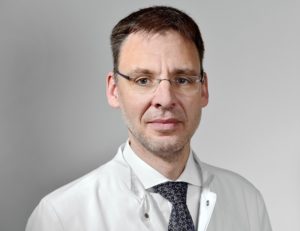An interview with Professor Mario Rüdiger, Professor for Neonatology and Pediatric Intensive Care Medicine, Head of Department at the Neonatal Research Group at the University Hospital Dresden, Germany

What was the idea behind the planned project?
In the past decades, improvements in feto-neonatal care have significantly reduced mortality. Long-term morbidity however, still represents a major problem. Most prominent disease entities with a feto-neonatal origin are chronic lung disease of preterm infants, sepsis and brain injury. Though affecting hundred thousands of patients every year, these diseases are of little interest to the industry.
Scientific evidence suggests a beneficial effect of regenerative therapies in these disease entities, with the most promising intervention being based on mesenchymal stromal cells (MSC)[1]. Whereas MSC have become standard therapy in some adult diseases, translation into neonatal routine care was hampered by the lack of firstly, a cell product of clinical grade that can be used in newborns and secondly, well-performed clinical studies testing these cells.
That’s where our project offers solutions to overcome these problems.
What are mesenchymal stem cells?
MSC are considered somatic stem cells which possess the potential to adapt to the microenvironment of injured organs and to regulate the healing process by secreting various factors. Therefore, they have also been termed “medicinal signalling cells” which ameliorate severe complications of diseases. MSC will not stay within the host tissue but will disappear after about two weeks. Therefore the risk of potential long-term complications is very low and the cells are considered to be safe.
What will you be doing in the project?
Our group has developed a way to manufacture MSC from the umbilical cord tissue of healthy term born infants in a high quality and has thereby opened a unique chance of successfully transferring MSC-based therapies into neonatal routine.
Based on that technique, we, the MASC-collaboration will establish the prerequisites for getting the MSC licensed for chronic lung disease of preterm infants. Therefore, we will conduct four clinical trials in Europe, Canada and the USA. The results from these trials will then be analysed together in a meta-analysis based on single patient data.
Furthermore, we will investigate prospectively further applications of MSC in newborns, focusing on brain-injury, sepsis and on the patient/parent perspective.
What is the aim of the “MASC-n-EU” project?
The European MASC-collaboration dedicates its effort with the “MASC-n-EU” project (“MSC to Ameliorate Severe Complications in Newborns in Europe”) to introduce umbilical cord-MSC-based therapy into neonatal care, with a special focus not only on treating but also preventing diseases originating in the feto-neonatal period. By providing a medicinal product specifically developed for the use in newborns we are addressing a great need and will improve the health of children in Europe.
Which professional areas will be involved?
The European MASC-collaboration dedicates the combined expertise and enthusiasm of leading scientists, clinicians, patient organisations, regulatory authorities and industry to make MSC-based regenerative therapies an integral part of clinical routine in newborns. Thereby, the European collaboration is embedded in a strong international network of experts, ensuring the success and sustainability of the project.
Thank you Prof. Rüdiger, for giving us insights into this innovative project.
[1] multipotent stromal cells that can differentiate into a variety of cell types.

